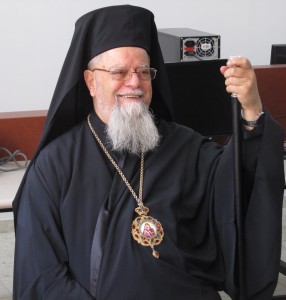Abuna Elias Chacour | Israel/Palestine

The distressed village of Ibillin in the Galilee is where Abuna Elias Chacour began his peacemaking work, drawing on his local heritage and his stature as an ordained Melkite Catholic priest. Abuna, which means “Our Father” in Arabic, considers himself a person of many identities: Palestinian, Arab, Christian, and an Israeli citizen. Above all, however, he defines himself simply: “I was born a baby in the likeness of God, not more, not less either.”
In 1947, Abuna’s childhood home was confiscated, as the Palestine mandate became the State of Israel. Life in the Galilee was rife with violence and tension between Jews and Palestinians. But Abuna always recalled the words of his father: “We do not use violence ever, even if someone hurts us,” he would say. “The Jews and Palestinians are brothers – blood brothers. We share the same father, Abraham, and the same God. We must never forget that.”
Inspired by the lessons of his parents, Abuna turned to his family’s Melkite Catholic Church with a desire to create positive change. He left his parents at the tender age of 12 to study the Bible, eventually traveling to France and Geneva. But he always felt the Galilee calling him back to serve.
Abuna returned to the Galilee and noticed that, despite their many differences, all religious groups shared a love of children. He also noticed that there was a lack of quality education for disadvantaged Palestinian students. Abuna had found his calling. In 1982, he founded the Prophet Elias High School in the village of Ibillin – a school that would not discriminate based on religion or ethnicity.
The school began with 80 students and grew into the Mar Elias Educational Institutions (MEEI), which now boasts more than 4,000 students from kindergarten through the university level. It is a place where Christian, Muslim, Jewish, and Druze students live together and learn how to invest in a shared future. The mural in the convening room behind the chapel shows Mohandas K. Gandhi, Martin Luther King, Jr., a Christian cross, a Jewish star and an Islamic crescent. When there was a suicide bombing in Haifa, the students donated their blood, regardless of ethnicity or religion. This is just one example of the simple acts Abuna encourages as the students learn to appreciate their common humanity and act accordingly.
Throughout his life, Abuna has followed the message of Jesus: “get your hands dirty to build a human society for human beings; otherwise, others will torture and murder the poor, the voiceless and the powerless.” Yet Abuna’s efforts have not always been welcome. He encountered considerable resistance from the Israeli government toward his schools, and vandals more than once disrupted construction – sabotaging one site so severely that Abuna was badly injured by falling bricks. His work resulted in other risks as well. While en route to Lebanon, for example, Abuna was kidnapped and interrogated by members of the PLO. From Abuna’s appearance, they could not figure out his identity – for all they knew, he was a Jewish man masquerading as a priest, ready to destroy Lebanon’s places of worship. Abuna was only freed after he convinced them of his peaceful reconciliation efforts and pluralistic identity.
Notwithstanding these difficulties, MEEI has thrived. The Israeli Ministry of Education considers it one the best schools in Israel, and its groundbreaking emphasis on pluralism and inclusion has brought it worldwide appreciation. In 2006, Abuna was named the Archbishop of the Galilee, making him the most senior cleric of the Melkite Greek Catholic Church in the Holy Land.
In January 2014, Abuna announced his retirement from his position as archbishop, allowing him to devote even more time to traveling and speaking about shared respect.